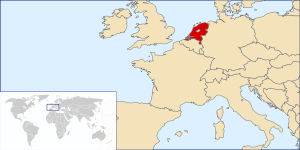Commons:Copyright rules by territory/Netherlands
Contents
Summary
| Countries, areas, and entities | Standard copyright term (based on authors' deaths) |
Other copyright terms (based on publication and creation dates) |
Copyright exemptions | Notes
| |||
|---|---|---|---|---|---|---|---|
( |
70 p.m.a.: life + 70 years[1] |
|
|
| |||
| {{PD-old-auto|author died 1947 or earlier}} | {{PD-EU-no author disclosure}} |
{{FoP-Netherlands}}
See also Category:PD Netherlands license tags |
Netherlands Overview
Dutch laws and legal judgments are completely free of copyright (Article 11 of Dutch copyright law of 1912).
In principle all works communicated to the public by or on behalf of the public authorities (government) may be freely distributed (this includes modifications and derivatives) in the Netherlands unless the copyright has been reserved explicitly, either in a general manner by law, decree or ordinance, or in a specific case by a notice on the work itself or at the communication to the public. This is regulated in (Article 15b of Dutch copyright law of 1912). Entities like the Silicose Oud-mijnwerkers foundation can also be regarded as public authorities (AbRS 30 November 1995, JB 1995/337) and are not automatically copyright protected.
Works of individual authors enjoy copyright protection until 70 years after the 1st January following the author's death. The duration of the copyright belonging jointly to two or more persons in their capacity as co-authors of a work shall be calculated from 1 January of the year following the year of the death of the last surviving co-author. The copyright in a work of which the author has not been indicated or has not been indicated in such a way that his identity is beyond doubt shall, or a public institution, association, foundation or company is deemed the author, expires 70 years after 1 January of the year following that in which the work was first lawfully communicated to the public.
Posthumously published works before 1995 have a copyright until 50 years after publication (pre-1995 law's term), or 70 years after the death of the author (post-1995 law's term), whatever duration is the longest (art. 51 transitional clause[3]).
Outside Europe
The information applies to the part of the Kingdom of the Netherlands located in Europe. In the Caribbean Netherlands (part of the Netherlands proper as well), the Auteurswet BES applies, with a copyright duration of 50 years after the death of the author. This law is based on the corresponding law of the Netherlands Antilles (auteursverordening 1913), which is also the same as in CuraƧao, Aruba (s:nl:Auteursverordening (Aruba))and Sint Maarten (auteursverordening).
References
- ā Art. 37, Auteursrecht (Copyright Act, 1912), as amended by the Acts of 21 December 1995
- ā Art. 38, Auteursrecht (Copyright Act, 1912), as amended by the Acts of 21 December 1995
- ā Used e.g. to restore the copyright on until 1984 unpublished portions of Anne Frank's diary.[1]
See also
- Threshold of originality: see Commons:TOO#Netherlands
- Freedom of panorama: see COM:FOP#Netherlands
- Category:PD Netherlands license tags
Editing this page
- To edit the body text (everything between
<onlyinclude></onlyinclude>tags), use the Edit button or section editing - To edit the table: Edit
Commons:Copyright rules by territory/Netherlands - To edit the "see also": edit (or add)
|seealso=parameter of {{CRT-territory-bottom}} at the bottom of the page.
